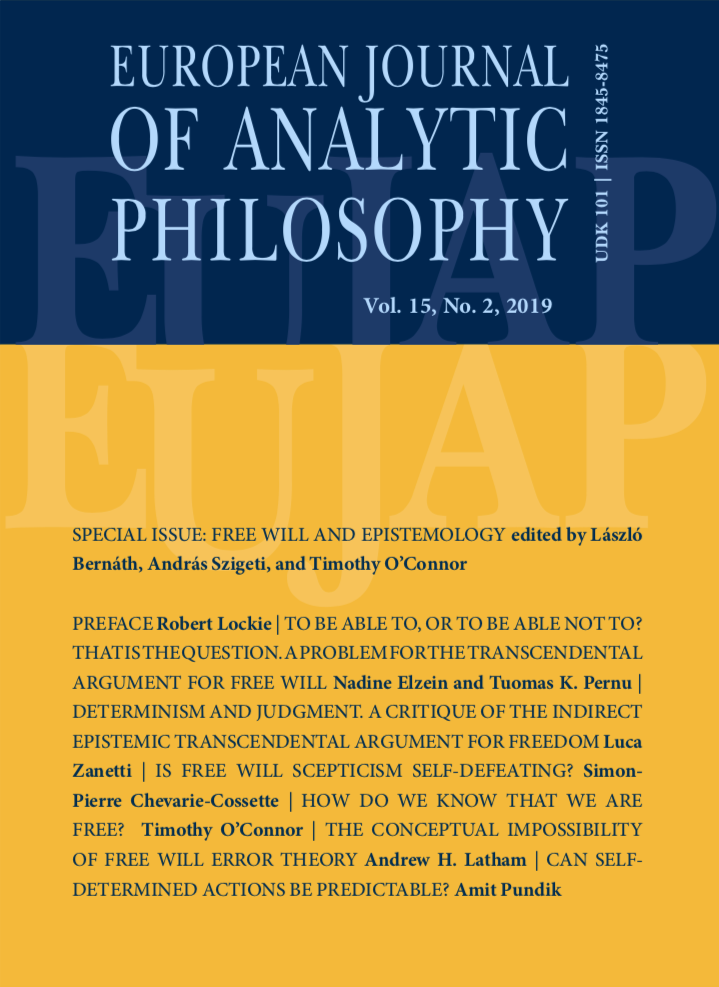ARTICLES
Tamaz Tokhadze
Article 1 | Pages: (A1)5-26 | Abstract | DOI: 10.31820/ejap.18.1.1
Extreme Permissivism is the view that a body of evidence could rationally permit both the attitude of belief and disbelief towards a proposition. This paper puts forward a new argument against Extreme Permissivism, which improves on a similar style of argument due to Roger White (2005, 2014). White’s argument is built around the principle that the support relation between evidence and a hypothesis is objective: so that if evidence 𝐸 makes it rational for an agent to believe a hypothesis 𝐻, then 𝐸 makes it rational to believe 𝐻, for all agents. In this paper, I construct a new argument against Extreme Permissivism that appeals to a logically weaker, less demanding view about evidential support, Relational Objectivity: whether a body of evidence 𝐸 is more likely if 𝐻 is true than if 𝐻 is false is an objective matter and does not depend on how any agent interprets the relationship between 𝐸 and 𝐻. Relational Objectivity is solely concerned with the conditional probabilities called likelihoods and does not put substantive constraints on an agent’s prior and posterior credences. For this reason, the presented argument avoids the standard permissivist criticism levelled against White’s argument.
Domingos Faria
Article 2 | Pages: (A2)5-22 | Abstract | DOI: 10.31820/ejap.18.1.2
Our main question in this paper is as follow: (Q) What are the epistemic norms governing our responses in the face of disagreement? In order to answer it, we begin with some clarification. First, following McHugh (2012), if we employ a useful distinction in normativity theory between evaluative and prescriptive norms, there are two readings of (Q)––we explore such distinction in section 2. And secondly, we accept gnosticism, that is, the account that the fundamental epistemic good is knowledge. It is with this assumption that we want to answer (Q). So, if gnosticism is true, what is the plausible answer to (Q)? In section 3 we argue for gnostic disagreement norms as response to (Q) and in section 4 we apply such norms to particular cases of disagreement.
Ema Sullivan-Bissett
Article 3 | Pages: (A3)5-24 | Abstract | DOI: 10.31820/ejap.18.1.3
In this paper I consider the project of offering an evolutionary debunking explanation for transparency in doxastic deliberation. I examine Nicole Dular and Nikki Fortier’s (2021) attempt at such a project. I suggest that their account faces a dilemma. On the one horn, their explanation of transparency involves casting our mechanisms for belief formation as solely concerned with truth. I argue that this is explanatorily inadequate when we take a wider view of our belief formation practices. I show that Dular and Fortier overstate the extent to which adaptive non-evidentially supported beliefs are rare, and the implausibility of disjunctive evolutionary systems. They should allow a role for the non-truth directed behaviour of our mechanisms of belief formation. On the other hand, we might restrict the explanation offered by Dular and Fortier to the deliberative context, that is, we might understand them as allowing for non-evidential belief formation outside of the deliberative context, but as identifying the key to explaining transparency in the truth-directed evolutionary mechanisms as they operate in the deliberative context. However, this would land them on the second horn of the dilemma: we would then have no different an explanation to one I have offered elsewhere (2018), an explanation which Dular and Fortier explicitly put aside as engaged in a project different from their own. I finish by briefly considering some broader implications relating to explaining transparency, the nature of belief, and the prospects for pragmatism. I conclude that Dular and Fortier’s debunking explanation of transparency bestows an implausible role for truth in fixing our beliefs, or, if it doesn’t, then we simply have the restatement of a view explicitly disavowed by the authors. We are left, then, with an explanation we ought not want, or an explanation we already had.
DISCUSSION
Gregory Miller
Article 3 | Pages: (D1)5- | Abstract | DOI: 10.31820/ejap.18.1.4
In this journal S. Siddharth has recently argued that the phenomenal bonding response to the subject summing argument for panpsychism is question begging, therefore we should reject constitutive forms of panpsychism. The argument specifically focuses on the proposals of Goff and Miller. In this reply, I show that the argument is unsound.
BOOK REVIEWS
David Grčki
Pages: (R1)5-8 | BOOK REVIEW
BOOK REVIEW Toril Moi, Rita Felski, and Amanda Anderson, CHARACTER: THREE INQUIRIES IN LITERARY STUDIES, University of Chicago Press, 2019, ISBN-13: 978-0-226-65866 (paper), ISBN-13: 978-0-226-65883-4 (e-book), Hardcover, $60.00, Paperback, $20.00, e-book, $14.01
David Grčki
Pages: (R2)5-8 | BOOK REVIEW
BOOK REVIEW Kengo Miyazono and Lisa Bortolotti, PHILOSOPHY OF PSYCHOLOGY: AN INTRODUCTION, Cambridge, Polity Press, 2021, ISBN-13: 978-1509515486 (paper), ISBN-13: 509515488 (e-book), Hardcover, $ 40.89, Paperback, $20.00, e-book, $24.95
Viktor Ivanković
Pages: (R3)5-10 | BOOK REVIEW
BOOK REVIEW José Luis Bermúdez
FRAME IT AGAIN: NEW TOOLS FOR RATIONAL DECISION-MAKING,Cambridge University Press, 2020, pp. x + 330, ISBN-13: 978-1107192935, ISBN-10: 1107192935, Hardcover, $ 18.22, e-book, $15.49

